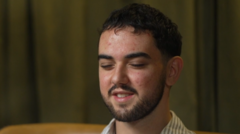Calum Macdonald's journey through Southeast Asia took a devastating turn when he began to lose his sight in the midst of a trip from Laos to Vietnam. After consuming free whisky and vodka shots at a hostel in Vang Vieng, he experienced a strange "kaleidoscopic blinding light," which foreshadowed his complete loss of vision. Now 23, Calum is sharing his tragic story, one of many linked to a deadly methanol poisoning incident in Laos last November that claimed six lives, including those of two Danish tourists he had met.
As he and his friends attempted to dismiss their symptoms as mere food poisoning, it became increasingly clear something was gravely amiss when they arrived at their hotel in Vietnam. Unable to perceive the existing light, Calum's realization that he had lost his sight was an agonizing moment. Alongside fighting personal adversity, he is advocating for greater transparency from the UK Foreign Office regarding the dangers of methanol poisoning, particularly prevalent in low-cost alcoholic beverages in Southeast Asia.
Tragic accounts like that of Simone White, another victim who drank free shots at the same hostel, emphasize the impact of such poisonings. Despite her joyful messages to her mother, Simone's life ended abruptly in a coma after she consumed the poisoned spirits. Her mother, Sue, recalls the harrowing call from a doctor urging her to consent to urgent surgery, fearing the worst before she could even reach her daughter.
Methanol, a toxic type of alcohol, often contaminates poorly manufactured drinks and has caused numerous deaths in the region. Short-term effects often mimic hangovers, while severe poisoning can lead to blindness or death within hours of consumption. Calum's perspective on his own blindness has shifted as he copes with his circumstances, feeling a responsibility to raise awareness for others and prevent these tragedies from recurring.
In a backdrop of distressing stories, including those of Kirsty McKie and Cheznye Emmons, who also tragically succumbed to methanol poisoning, Calum emphasizes the importance of avoiding free alcohol and counterfeit spirits while traveling. Though the Foreign Office recognizes the serious risks involved, many travelers remain unaware, prompting calls for better awareness initiatives. As survivors like Calum work to disseminate vital information, their experiences serve as poignant reminders of the perilous consequences that can arise from neglecting safety protocols while abroad.
As he and his friends attempted to dismiss their symptoms as mere food poisoning, it became increasingly clear something was gravely amiss when they arrived at their hotel in Vietnam. Unable to perceive the existing light, Calum's realization that he had lost his sight was an agonizing moment. Alongside fighting personal adversity, he is advocating for greater transparency from the UK Foreign Office regarding the dangers of methanol poisoning, particularly prevalent in low-cost alcoholic beverages in Southeast Asia.
Tragic accounts like that of Simone White, another victim who drank free shots at the same hostel, emphasize the impact of such poisonings. Despite her joyful messages to her mother, Simone's life ended abruptly in a coma after she consumed the poisoned spirits. Her mother, Sue, recalls the harrowing call from a doctor urging her to consent to urgent surgery, fearing the worst before she could even reach her daughter.
Methanol, a toxic type of alcohol, often contaminates poorly manufactured drinks and has caused numerous deaths in the region. Short-term effects often mimic hangovers, while severe poisoning can lead to blindness or death within hours of consumption. Calum's perspective on his own blindness has shifted as he copes with his circumstances, feeling a responsibility to raise awareness for others and prevent these tragedies from recurring.
In a backdrop of distressing stories, including those of Kirsty McKie and Cheznye Emmons, who also tragically succumbed to methanol poisoning, Calum emphasizes the importance of avoiding free alcohol and counterfeit spirits while traveling. Though the Foreign Office recognizes the serious risks involved, many travelers remain unaware, prompting calls for better awareness initiatives. As survivors like Calum work to disseminate vital information, their experiences serve as poignant reminders of the perilous consequences that can arise from neglecting safety protocols while abroad.



















